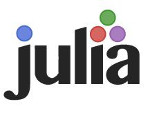| Julia Gets $600K |
| Written by Kay Ewbank |
| Tuesday, 17 November 2015 |
|
Julia has been given $600K by the Moore Foundation to get the dynamic language to a production version. The money will be granted over the next two years so the Julia Language team can move their core open-source computing language and libraries into the first production version. The Julia Language project aims to create a free and open-source language that is general purpose but designed to excel at numerical computing and data science. Julia is a dynamic language for technical computing that is especially good at running MATLAB and R-style programs. Julia first came to public attention in 2012, but development began on it in 2009 by MIT professor of Computer Science Alan Edelman with Jeff Bezanson, Stefan Karpinski, and Viral B. Shah. The Gordon and Betty Moore Foundation awarded the grant as part of its Data-Driven Discovery Initiative. This has a goal to create more efficient and powerful scientific computing tools to assist in data-driven research. The Foundation says that Julia’s combination of a general purpose language that excels at numerical computing and data science reduces the need for researchers to learn and use multiple programming languages to perform computational analyses and surrounding tasks. According to a post about the grant on the Moore Foundation blog: “The benefits of using Julia over other languages for scientific work include: its low barrier to entry for scientists and mathematicians, its flexibility and high performance (comparable to C), its graphics and visualization capabilities, and its ability to handle large computational problems efficiently.” Chris Mentzel, Director of the Moore Foundation’s Data-Driven Discovery Initiative, said: “Scientists today are limited by current practices to extract useful information which can hamper research. We need new tools that can make it easier. The Julia Language offers significant benefits to data-driven researchers and should help speed the pace of discovery.” The funding should enable the Julia Language to take the language from its current beta status to its first long-term supported 1.0 version. This will involve the team making improvements to the various libraries, including statistical, mathematical and graphical, to develop a debugger, a profiler, and an integrated development environment. Julia is already achieving popularity despite its beta status. There's an interesting introduction to the base language and what future directions might be in the video below from JuliaCon 2015:
Back in 2012, the creators of Julia said they wanted to create an open source language that combined the speed of C with the dynamism of Ruby. In a post entitled Why we created Julia, the developers said: "We want a language that’s homoiconic, with true macros like Lisp, but with obvious, familiar mathematical notation like Matlab. We want something as usable for general programming as Python, as easy for statistics as R, as natural for string processing as Perl, as powerful for linear algebra as Matlab, as good at gluing programs together as the shell. Something that is dirt simple to learn, yet keeps the most serious hackers happy. We want it interactive and we want it compiled."
More InformationRelated ArticlesJulia Studio - An IDE For Julia
To be informed about new articles on I Programmer, sign up for our weekly newsletter, subscribe to the RSS feed and follow us on Twitter, Facebook or Linkedin.
Comments
or email your comment to: comments@i-programmer.info |
| Last Updated ( Tuesday, 01 January 2019 ) |


